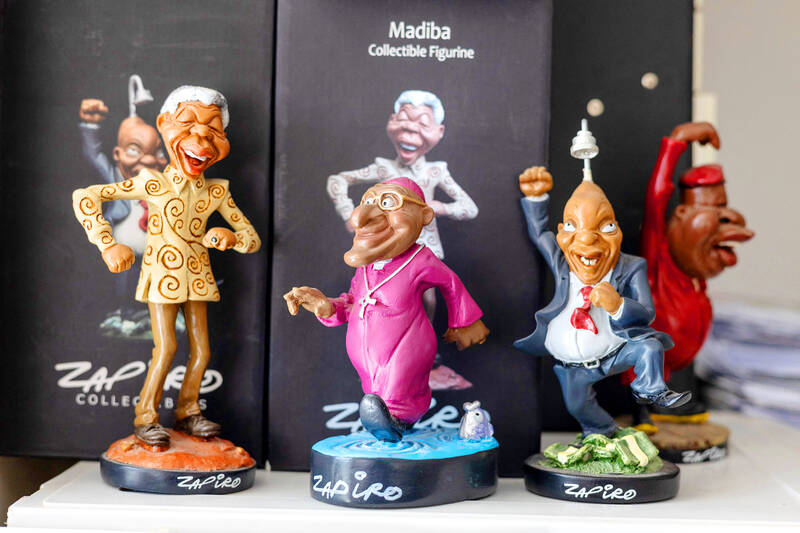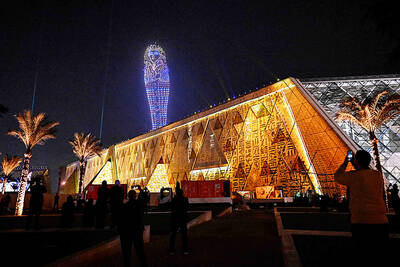South Africa’s most famous cartoonist, Zapiro, says the upcoming elections brought an unexpected gift — the surprise comeback of his favorite subject, former South African president Jacob Zuma.
The caricaturist has depicted the 82-year-old politician with a shower head poking out of his skull for almost two decades and has no intention of stopping.
“The shower man is giving us trouble,” he said. “I have huge fun drawing Zuma.”

Photo: AFP
Zapiro came up with the shower gibe in 2006 after Zuma infamously told a rape trial he took a shower after having unprotected sex with an HIV-positive woman to avoid contracting the virus.
The depiction is known to irritate the graft-accused former president who has sued Zapiro several times with little success.
Thirty years after democracy ended decades of apartheid regime censorship, political satire is alive and kicking — and scandal-tinged Zuma remains a source of inspiration to many.
“Zuma is giving us amazing material, this is a very exciting time,” said 34-year-old cartoonist Nathi Ngubane, who was born a month after former South African president Nelson Mandela was released from prison.
Forced out of office under a cloud of corruption in 2018, Zuma has returned with a bang as head of a new opposition party, uMkhonto we Sizwe (MK).
The move has shaken up South African politics, with polls showing MK could pull off an upset on May 29, winning more than 10 percent of the vote. That could see his former political party — the ruling African National Congress (ANC) — return its worst result in three decades and lose its parliamentary majority.
Ngubane said his parents, who are Zulus like Zuma, were initially shocked at his irreverent depictions.
“In black South African culture, you are expected to respect your elders,” he said.
Yet, he was unmoved.
“Because I can, I pressed on,” he said. “We have to use our freedom.”
In one of his recent drawings, Zuma is seen wearing traditional Zulu garb as he spikes his ANC rival, South African President Cyril Ramaphosa.
The latter was a tough nut to crack, said Zapiro, whose real name is Jonathan Shapiro.
“Cyril took me ages,” he said in an interview in his sunny Cape Town studio, his dog Captain Haddock lying under the desk. “He is the most reluctant president we have ever had.”
Ramaphosa came to power on largely unfulfilled promises of stamping out corruption. Zapiro now draws him as “spineless” or as a “faux superhero.”
Getting a cartoon right takes a lot of pondering, he said.
“I never start out with a joke or a drawing. I use my left brain. I look at what are the issues, what is in the news and how I react to it,” he said.
Recently he drew himself reflecting about whether artificial intelligence (AI) threatened his work in a series of vignettes for the Daily Maverick newspaper where he works.
After an analysis of the current state of political play, including Ramaphosa interrupted by a blackout during a speech outlining progress in tackling outages and a Zulu nationalist party using its late leader as the face of the election campaign, his character concludes it does not.
“Cartoonists will be the last to go,” said Zapiro, who sports a neat goatee, explaining AI does not “see irony in stuff.”
“I’ll never run out of material in a place like South Africa,” he said. “We have wild politicians.”
For tragic events like a wave of xenophobic violence that killed dozens of people in 2008, he uses Mandela and late archbishop Desmond Tutu, shown side by side, to represent the nation’s moral conscience.
“Critical thinking is what cartooning is about,” he said. “I point out the anomalies to help things get better.”
Yet, as South Africa struggles with high unemployment, rampant crime, failing infrastructure and widespread graft, he sometimes feels a “dissonance” between his role as a satirist and as a citizen.
“We are absolutely at a tipping point,” he said. “The next five years are going to be unbelievably scary.”

‘CHILD PORNOGRAPHY’: The doll on Shein’s Web site measure about 80cm in height, and it was holding a teddy bear in a photo published by a daily newspaper France’s anti-fraud unit on Saturday said it had reported Asian e-commerce giant Shein (希音) for selling what it described as “sex dolls with a childlike appearance.” The French Directorate General for Competition, Consumer Affairs and Fraud Control (DGCCRF) said in a statement that the “description and categorization” of the items on Shein’s Web site “make it difficult to doubt the child pornography nature of the content.” Shortly after the statement, Shein announced that the dolls in question had been withdrawn from its platform and that it had launched an internal inquiry. On its Web site, Le Parisien daily published a

China’s Shenzhou-20 crewed spacecraft has delayed its return mission to Earth after the vessel was possibly hit by tiny bits of space debris, the country’s human spaceflight agency said yesterday, an unusual situation that could disrupt the operation of the country’s space station Tiangong. An impact analysis and risk assessment are underway, the China Manned Space Agency (CMSA) said in a statement, without providing a new schedule for the return mission, which was originally set to land in northern China yesterday. The delay highlights the danger to space travel posed by increasing amounts of debris, such as discarded launch vehicles or vessel

RUBBER STAMP? The latest legislative session was the most productive in the number of bills passed, but critics attributed it to a lack of dissenting voices On their last day at work, Hong Kong’s lawmakers — the first batch chosen under Beijing’s mantra of “patriots administering Hong Kong” — posed for group pictures, celebrating a job well done after four years of opposition-free politics. However, despite their smiles, about one-third of the Legislative Council will not seek another term in next month’s election, with the self-described non-establishment figure Tik Chi-yuen (狄志遠) being among those bowing out. “It used to be that [the legislature] had the benefit of free expression... Now it is more uniform. There are multiple voices, but they are not diverse enough,” Tik said, comparing it

Prime ministers, presidents and royalty on Saturday descended on Cairo to attend the spectacle-laden inauguration of a sprawling new museum built near the pyramids to house one of the world’s richest collections of antiquities. The inauguration of the Grand Egyptian Museum, or GEM, marks the end of a two-decade construction effort hampered by the Arab Spring uprisings, the COVID-19 pandemic and wars in neighboring countries. “We’ve all dreamed of this project and whether it would really come true,” Egyptian Prime Minister Mostafa Madbouly told a news conference, calling the museum a “gift from Egypt to the whole world from a